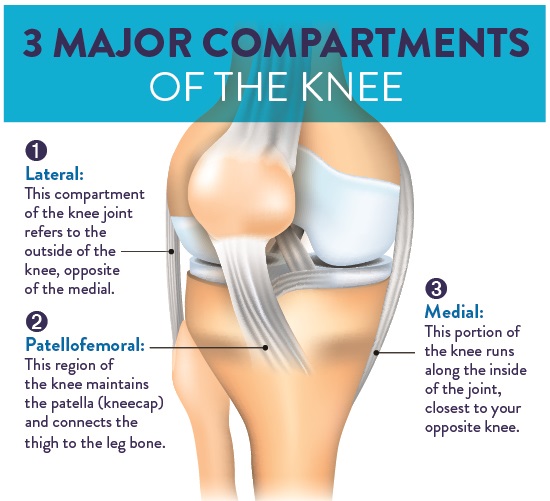Partial vs. Full Knee Replacements

June 24, 2022
Knee replacement surgery is a common procedure, designed to relieve pain and stiffness of the knee joint. After arthritis or injury damages the joint, knee replacements help recover and improve daily functionality––restore the integrity of the knee.
When there is damage to the cartilage of your knee, your primary care doctor will typically refer you to an orthopedic specialist who will help you understand the best treatment option for you. Surgical treatment may be appropriate if pain can no longer be alleviated by non-surgical treatments, such as medication and physical therapy.
“Anti-inflammatories and injections only provide temporary relief; they do not restore loss of cartilage,” says orthopedic surgeon, James Cahill, M.D. “Arthritic symptoms tend to progress in severity over time, and sometimes surgery is the best option for long-term relief.”
The Difference Between Partial and Full
The knee consists of three major compartments, whose independent operating conditions determine whether you require a partial or full knee replacement:

Full knee replacements replace the entire joint with an artificial, internal prosthesis. “Typically, complete replacements occur when two or more compartments of the joint exhibit significant damage and require an implant to support normal function—or if a patient has a complication including deformity from long-term arthritis,” says Dr. Cahill.
Partial knee replacements only address the damaged compartments of the knee joint, using metal or plastic compartments to resurface the damaged areas. “In some cases, just one compartment is affected in the knee,” says Dr. Cahill. “In this case, a person may be a candidate for partial knee replacement.”
“Robotic partial knee replacements are very often a great solution for younger athletic patients who would like to maintain a high level of activity and competition,” he adds.
An orthopedic surgeon will help you understand which procedure is best for you by assessing your medical history, range of motion, strength and stability through various X-Rays and examinations. If surgery is necessary, your surgeon will plan to implant a prosthetic joint, made of medical-grade plastic, metal or ceramic materials that mimic the function of a natural, healthy knee joint.
“Whether a patient suffers from osteoarthritis, rheumatoid arthritis or post-traumatic arthritis, the technology and surgical techniques can be tailored to address the underlying cause. Knee replacements can significantly improve range of motion and alleviate the pain caused by the loss of or damage to cartilage,” Dr. Cahill advises.
Are You a Candidate for a Robotic Procedure?
Robotic-assisted knee replacement, whether partial or total, may be an option, depending on a variety of factors. If a robotic-assisted procedure is appropriate, it may help increase precision of the implant placement––sometimes leading to shorter recovery time.
“If you are planning knee replacement with your doctor, understand what all your options are and which best suits your goals,” says Dr. Cahill. “Many patients are capable of resuming activities of daily living within three to five weeks of their procedure.”
Next Steps & Resources:
- Meet our source: James Cahill, M.D.
- To make an appointment with a doctor near you, call 800-822-8905 or visit our website.
- Learn more about knee replacement surgery at Hackensack Meridian Health
The material provided through HealthU is intended to be used as general information only and should not replace the advice of your physician. Always consult your physician for individual care.
Why Do Your Knees Hurt When You Squat?

Whether you’re doing squats during your workout routine or you’re crouching down to reach something on a bottom shelf, you may stop yourself mid-activity because squatting makes your knees ache.
How Can I Treat My Joint Pain Without Medication?

Our joints bear a heavy burden, so it’s common to feel pain and discomfort in any number of them.

Robotic Knee Replacement Surgery Gets 75-Year-Old Back in the (Golf) Game
Frank Fiorella, Jr., becomes the first patient at Ocean University Medical Center to benefit from CORI robotic-assisted technology for knee replacement surgery.

Avid Golfer from Sea Girt Tees up with Partial Knee Replacement
Former Jersey Shore University Medical Center nurse Sue Blasi is back walking her beloved beagle 3 miles a day after successful partial knee replacement surgery.

How to Relieve Knee Pain Triggered by Everyday Activities
It’s not just vigorous movements that can produce knee pain, but everyday activities as well.
